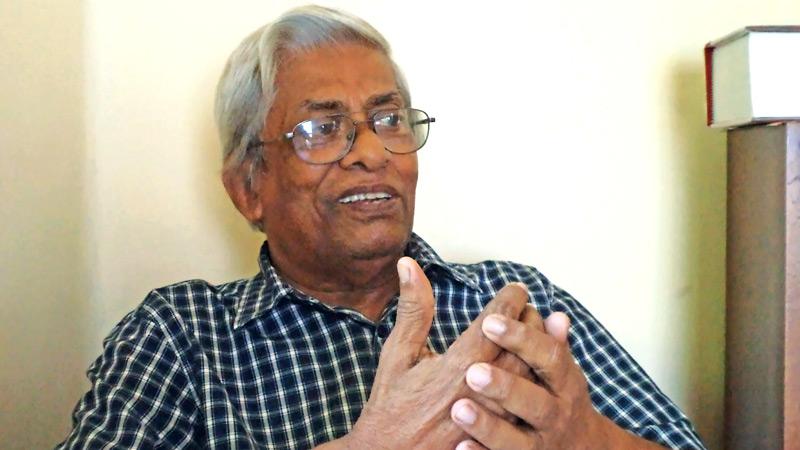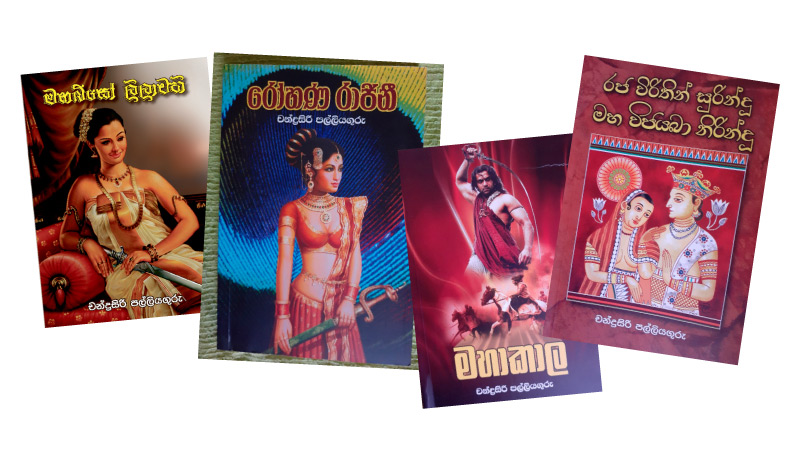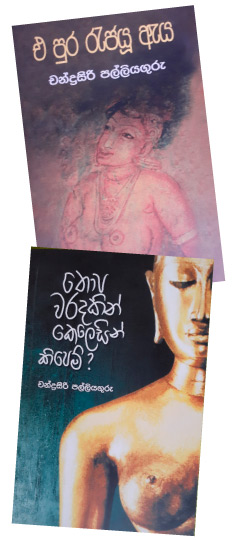

Prof. Chandrasiri Palliyaguru of the Kelaniya University is a scholar, literary translator as well as a novelist, at present focused on a historical novel. His main historical novels are එපුර රැජයූ ඇය (Epura Rajau Eya), තොප වරදකින් කෙලෙසින් කිපෙම්? (Thopa Waradakin Kelesin Kipem?), රජ විරිතින් සුරින්දූ මහ විජයබා නිරින්දූ (Raja Virithin Surinduu Maha Vijayaba Nirinduu), මහ බිසෝ ලීලාවතී (Maha Biso Leelawathie), රෝහණ රාජිනී (Rohana Rajini), මහා කාල (Maha Kaala). He has published a book on Rituals recently, namely, “Ceremonies, Festivals and Rituals of the Sinhalese” published by Sarasavi publishers.
The Sunday Observer discussed with him the historical novel, its boundaries and his own views on historical novels.
Excerpts:
 Q. What do you mean by historical novel?
Q. What do you mean by historical novel?
A historical novel is a creation based on historical facts, depicting the history of a nation, traditions and feelings of a period, while there should be some patriotic feeling for the reader too. It is, in fact a different kind of genre in the history of the novel.
Q. How do you describe your own historical novels?
I have written about seven historical novels starting from Queens and Kings, Anula (එපුර රැජයූ ඇය), Walagamba (මහා කාල), Maha Vijayabahu (රජ විරිතින් සුරින්දූ), Kashyapa (තොප වරදකින් කෙලෙසින් කිපෙම්?) Sugala (රෝහණ රාජිනී) etc. My feeling is that when you are writing a historical novel you have a kind of ski run that you would not get in a contemporary novel based on contemporary society. A historical novel is a different kind of novel where imagination is mixed with facts.
Q. You once said that the best Sinhala historical novel is Sada Melesa Pura Derane by A.V. Suraweera. Do you still believe that?
Yes. Sada Melesa Pura Derane was the best Sinhala novel at the state literary festival in that year, which helped it to gain much publicity. It depicts the tragedy of a King, namely Kashyapa which was never before seen in that aspect and reveals the balanced idea of a King. Apart from that A.V. Suraweera was a veteran writer.
Q. What are the best historical novels in foreign languages, in your opinion?
Many historical novels have been written by Italian writers. Tomasi di Lampedusa is one such Italian writer and his best historical novel is Il Gattopardo (The Leopard) first published in 1958, which is named as one of the 10 best historical novels by the British newspaper, The Observer in 2012. Another very good historical novel is Claudius first published in 1934, written by the English writer, Robert Graves. Nikos Kazantzakis’s Death and Freedom, Mika Waltari’s The Egyptian, are also among the best foreign language historical novels. I must especially mention a Hindi novel by Mahapandith Rahul Sankrithyayan’s From Volga to Ganga, which describes the emergence of civilization from the beginning to the present day.
Q. The general belief is that, historical novels are big books with more than 500 pages, but in Sri Lanka we see less than 300 page books as historical novels?
It depends on the topic of the novel selected by the author. It need not necessarily be a big book.
Q. How do you identify the historical novel from the epic novel? Do you think Lord of the Rings by J.R. Tolkin is a historical novel?
Lord of the Rings is not a historical novel, but an epic novel. It is not based on historical facts. One can say an epic novel is also a historical novel, because Ramayana and Mahabharatha, the great Indian epic stories are also based on a historical background. But the epics are mainly based on an imaginary context. A historical novel is, in fact a romantic novel mixed with actual facts and imagination.
Q. You once said that a historical novelist cannot diffuse or distort the historical facts. Is it correct?
Yes. Quite correct. He cannot distort the historical facts, but he can imagine things, which is not a distortion of history.
Q. Isn’t the novelist a historian?
No. If you are writing a story true to historical facts, it cannot be a novel, but a reportage. In a historical novel there is imagination mixed with facts. Without the imagination one cannot create a historical story or historical characters.
Q. Do you consider the novel, ක්ෂීර සාගරය කැලඹුණි (Ksheera Sagaraya Kelambuni) by Simon Nawagaththegama, as a historical novel?
No, it is not a historical novel, because there is no history in it. He does not deal with a historical period.
Q. But how does the reader know what is history and what is not history?
The reader should have a general knowledge about history. From our school days we learn our history, so it is not a problem for the readers to know the basic facts of history. In ක්ෂීර සාගරය කැලඹුණි (Ksheera Sagaraya Kelambuni) we encounter a very different history that we don’t know.
Q. What do you think about War and Peace by Leo Tolstoy?
That is a historical novel. It is not a fantasy, but a realistic novel based on the historical period in Russia.
Q. How about Gamperaliya by Martin Wickramasinghe which has a historical period too?
Can you call it a historical novel?
There are historical facts in it, but I think it deals more with the recent past rather than history.
If what you say is correct, every novel is a historical novel, because they deal with a period of time, that is not so. In the book written by George Lukas “Historical Novel” published in 1962, there are ample explanations for your above question.
Q. But Prof A.V. Suraweera, quoting well known critic Graham Hough says a novel dealing with a historical time, is a kind of historical novel.
Yes. Prof Suraweera quotes it, but apart from Graham Hough there are many critics on historical novels.
Q. You once said in an interview given to a newspaper, (කටවහරේ ලේඛන රීතිය) one cannot write a historical novel in the colloquial language?
One cannot write a historical novel in a colloquial language, as it will not depict the relevant historical period. As you know one cannot write a novel in the language which was used in the Anuradhapura or Polonnaruwa period, but one can establish the atmosphere of the historical period only by using some usages and words relevant to that period. If somebody is making a film based on a historical period he can use props belonging to that period to establish that period. Hence, a historical novelist too can use some of the usages, mannerisms and words to depict that period. Therefore in my view one cannot write a historical novel in the colloquial language. Only by the language corresponding to the characters, that you can create the atmosphere of the novel.
Q. What is your advice to an aspiring writer interested in writing a historical novel?
The main thing is you have to do a lot of research on the period and the characters you select. How people behave, talk and how they felt, are things you have to do research on. So, it takes time and it is not an easy task to write a historical novel. Without doing any research you can never write a historical novel. As for me, I use all sorts of historical sources when I begin to write a historical novel. Research is essential because the plot and the story are formed on the historical basis.
